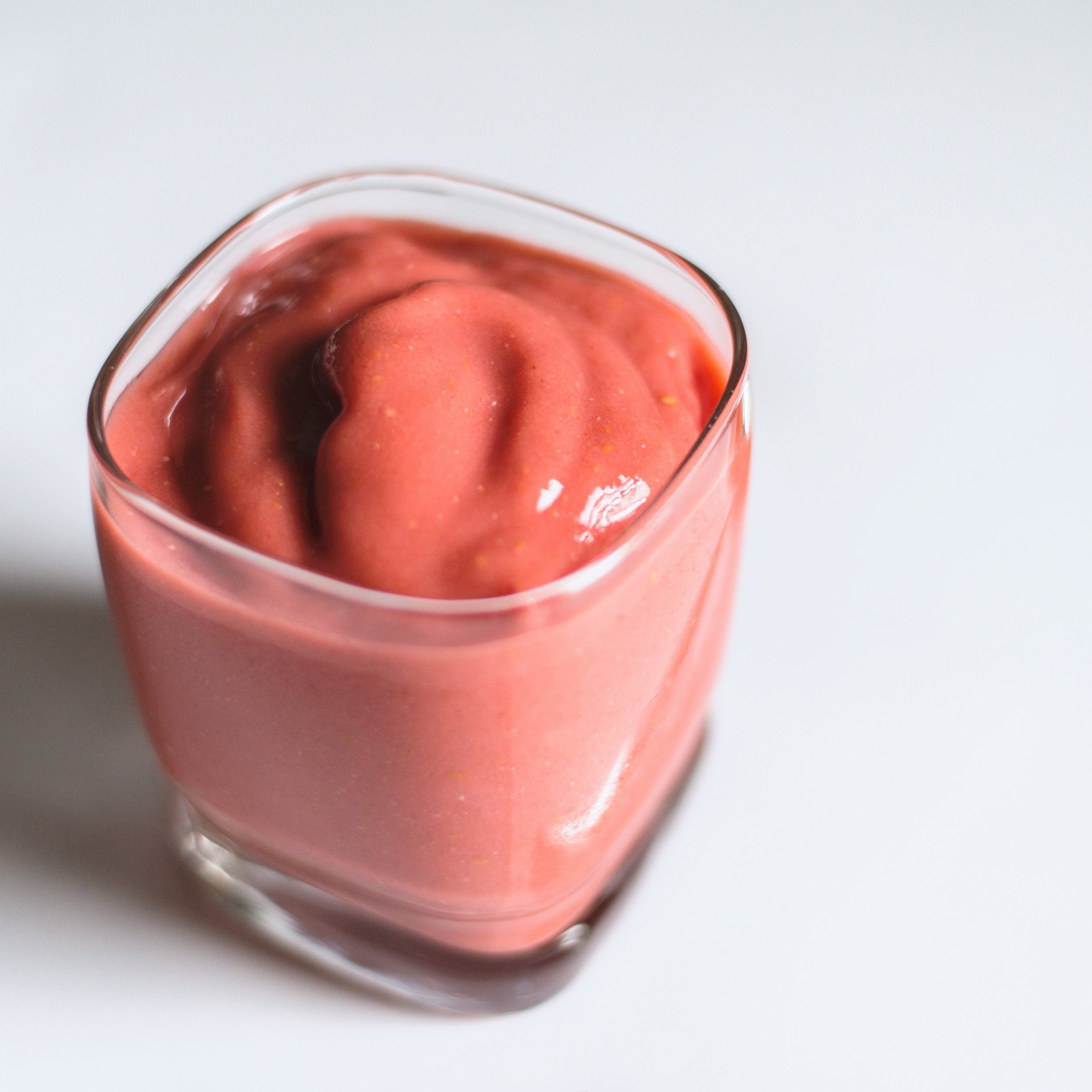While I generally recommend that my clients eat nutrient-dense, whole foods, rather than drinkable meals, like smoothies or green juices, smoothies are a favorite of many of my clients as a fast and convenient way to get in nutrients and energy. I agree so long as the smoothie contains the right balance of ingredients to be as nourishing as a proper meal. I often make them as an afternoon snack and I tend to crave them more in the morning during the warmer months.
Smoothies can be rough for blood sugar balance if you don’t build them appropriately but a healthy smoothie is possible! It’s important to limit higher sugar fruits and include plenty of quality fats, protein, and fiber to keep you satiated until your next meal.
Because a smoothie is essentially a bunch of foods blended together, is important that you chew it. While blending does make it easier on the digestive system, your body won’t digest it properly without the initiation of the digestive process. When consuming the smoothie, swish it around your mouth before swallowing it in order to get your digestive juices flowing. You can even try adding a crunchy ingredient as a garnish on the top and eating it with a spoon! Drinking your smoothie at room temperature rather than ice cold is also easier on digestion and can keep you from getting a brain freeze too.
A Healthy Balance Basic Formula (for one serving)
8 to 12 ounces of liquid
1 serving of protein
1-2 tablespoons fat
Up to one tablespoon fiber (start small and increase the amount over time)
Up to ½ cup of fruit (add more if your body needs an adjustment to less sweet smoothies and decrease the amount over time)
Up to 1 cup of vegetables (more even if you want!)
Extras
Below are my favorites for each of the components. Some ingredients may overlap in multiple categories.
Liquid
Pure, filtered water
Organic, non-dairy, unsweetened milk
Organic, unsweetened yogurt (dairy if tolerated, or non)
Coconut water (reduce sugar by adding water for half the liquid)
Protein – Choose high quality un-sweetened, grass-fed animal proteins and third-party tested vegan proteins when possible
Organic pea protein powder
Organic hemp protein powder
Hemp seeds
Grass-fed whey protein powder (beef or goat)
Fat
Avocado (1/4 – 1/2)
Seed or nuts/butters (organic peanut, almond, cashew, sesame/tahini, pumpkin seed etc.)
Coconut butter
Coconut oil
Cacao butter
Freshly ground flax
Chia seeds
Ghee
Extra virgin olive oil
Fiber
Chia seeds
Freshly ground flax
Acacia fiber
Avocado (1/4 – 1/2)
Rolled oats
Hemp seeds
Shredded coconut
Fruit
Organic berries (blueberries, raspberries, cherries, strawberries, blackberries etc.)
Lemon (juice or flesh)
Lime (juice or flesh)
Apples
Pears
Peaches
Kiwi
Banana (Green tipped)
Vegetables
Cauliflower
Zucchini
Greens (kale, chard, spinach, bok choy, dandelion, mustard, basil, arugula etc.)
Raw, steamed or roasted beets
Cooked pumpkin or winter squash
Cilantro, mint, parsley (or any other fresh herb!)
Sprouts
Cucumber
Fennel
Carrots
Extras – These are not mandatory by any means, but adding spices, adaptogens, and superfoods can add nutrition and boost your energy, immunity, reduce inflammation, balance hormones.
Pinch or two of sea salt (for electrolytes)
Ginger (I store in freezer and just grate it into the container)
Cinnamon, cayenne, nutmeg, turmeric
Vanilla extract or bean paste
Maca
Mushrooms (reishi, corydyceps, chaga etc.)
Cacao powder or nibs
Matcha
Moringa
Spirulina
Greens powder
Probiotic powder
A sample of my go-to recipes for a healthier smoothie:
Good Morning Smoothie
1 cup unsweetened almond milk
1 serving collagen peptides
1 tablespoon nut butter
1 tablespoon hemp seeds
½ cup frozen blueberries
2 giant handfuls of spinach or kale
Pinch of sea salt
1 teaspoon vanilla extract
Afternoon Treat Smoothie
1 cup coconut milk
1 serving collagen peptides
1 -2 tablespoons nut butter
¼ large or ½ small avocado
½ cup frozen banana
½ cup frozen cauliflower rice
1 heaping tablespoon cacao powder
Pinch of sea salt
1 teaspoon vanilla extract













